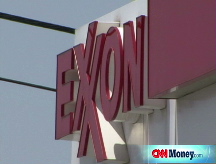Oil surges, ends over $43 a barrel
Anxiety over the bank sector is temporarily allayed as stocks bounce back. But analysts say oil will likely test $30 again.
NEW YORK (CNNMoney.com) -- Oil prices rose Wednesday, as investors kept a close eye on the rising financial markets for a sign that the economy may be on the path to recovery.
U.S. crude for March delivery ended the day up $2.71 to $43.55 a barrel. Wednesday settle is the highest in more than a week. Crude traded between $40 and $42 for most of the day.
Oil prices last closed above $43 a barrel on Jan. 6.
Normally on a Wednesday, the oil markets would receive a weekly supply report from the U.S. Department of Energy. However, this week's report was postponed until Thursday due to the observance of Martin Luther King Jr. day on Monday.
"Without the supply report, we'll get sideways trading with people keeping an eye over their shoulder at the financial markets," said Tom Kloza, chief oil analyst at Oil Price Information Service. "If the indexes continue to hemorrhage, it will be challenging for oil prices to go up."
The report is expected to show a 1.9 million barrel build up in crude supplies when it is released at 11 a.m. ET on Thursday, according to a survey of analysts polled by information service Platts.
The inventory report is also expected to show a 1.9 million increase in supplies of gasoline and a decline of 2.25 million barrels of distillates, which are used to make diesel fuel and home heating oil, according to the consensus estimate.
The likely buildup in oil stocks is preceded by a restoration of oil import levels and an expected decline in refinery activity, according to Platts senior oil analyst Linda Rafield.
Markets were in a slight rebound early Wednesday, after the stock market tumbled Tuesday on continued financial sector distress, despite the inauguration of President Obama. Still, demand for oil products has tanked since late last summer, as the financial sector has led the economic recession down to new depths.
"People tend to conserve fuel when they don't have jobs," said Kloza. "U.S. demand is just awful - and really, really down for transportation diesel."
As a result, oil has fallen in a relatively straight plunge from its all-time high near $150 a barrel in mid-July. Despite Tuesday's and Wednesday's rise, traders and analysts do not believe prices are trending higher yet. Instead, they say, the recent upward movement may be representative of an occasional hiccup in the market.
Goldman Sachs analysts said Tuesday that a target price for crude oil in the first quarter of 2009 will be around $30 a barrel, given still slumping demand.
The new president has pushed for a doubling of alternate, renewable energy production in the United States, including $72 billion of energy infrastructure improvements and renewable energy tax credits in the first draft of the economic stimulus bill.
In his inaugural address Tuesday, Obama said "each day brings further evidence that the ways we use energy strengthen our adversaries and threaten our planet."
Experts say his commitment to American-produced alternate fuel sources will not have an immediate impact on oil prices, but may drive them lower in the future.
"It's easy to tip behavior by a few percentage points by adjusting how much fuel we use," Kloza said. "This is going to be an administration that tips behavior towards less consumption."
Kloza said that Obama will likely succeed in his efforts to speed up fuel efficiency standards in automobiles. Furthermore, his calls for "responsibility" and "discipline" Tuesday may eventually persuade drivers of fuel-guzzling SUVs to purchase smaller cars. ![]()



